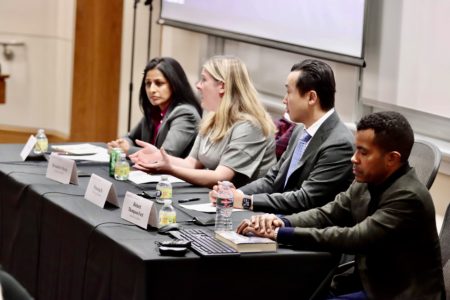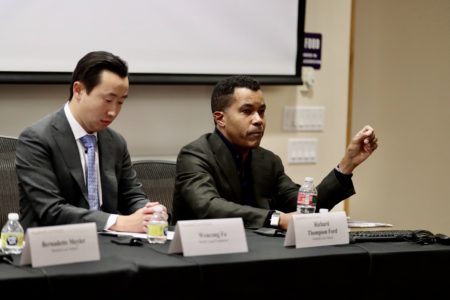Stanford Law School Panel Discusses History and Future of Affirmative Action
Event drew a standing-room-only crowd and featured prominent legal experts who addressed the admissions cases currently in front of SCOTUS
On November 14, Stanford Law School (SLS) hosted a one-hour speaker panel, “The Supreme Court and the Future of Affirmative Action,” co-sponsored by the Asian and Pacific Islander Law Students Association and the Stanford Constitutional Law Center. The event was held two weeks after the United States Supreme Court heard oral arguments in a much-watched pair of cases brought against Harvard College and the University of North Carolina by the anti-affirmative action group Students for Fair Admissions. The suits challenge the universities’ race-conscious admissions practices, specifically arguing that the schools’ policies result in discrimination against Asian American applicants.
The SLS faculty participants in the discussion were moderator Bernadette Meyler, JD ’03, the Carl and Sheila Spaeth Professor of Law, and Richard Thomas Ford (BA ’88), the George E. Osborne Professor of Law, who has written extensively on affirmative action. Ford kicked off the panel with a summary of 40 years of affirmative action case law, explaining how affirmative action programs that are challenged in court must survive strict scrutiny, the most stringent form of judicial review courts use to evaluate the constitutionality of laws or policies.

Meyler and Ford were joined by attorneys on opposite sides of the affirmative action argument.
Wencong Fa of the Pacific Legal Foundation spoke in support of the Students for Fair Admissions’ arguments for striking down affirmative action, saying any consideration of race in admissions decisions violates the 14th Amendment of the Constitution and that academic and other types of merit should be the primary driver of admissions.
Laboni Hoq, former litigation director of Advancing Justice – Asian Law Caucus, said the courts have long upheld the use of race as one factor, among many, in college admissions considerations, and the constitutionality of doing so should be considered long-settled law. Additionally, the factual records in the cases currently before the court show no discrimination against Asian Americans, she said. “They had multiple experts, and they had the actual application files themselves that Students for Fair Admissions was able to identify and look through. They couldn’t point to a single file in which they could identify any Asian American who was discriminated against.”
All of the panelists agreed that when the Supreme Court issues its opinion in Students for Fair Admissions, expected by summer 2023, it is likely to overturn 40 years of precedent and find affirmative action unconstitutional.
The panelists also focused part of the discussion on the type of leadership universities will need to demonstrate in the event affirmative action is invalidated.

“One of the most important things that everyone can do, including university leadership, is to not confuse the formal outcome of the Supreme Court’s decision with their sense of justice,” said Ford. “You have to obey the letter of the law, but you don’t have to like it and you don’t have to take on what the Court is saying is justice.”
Ford noted that universities will have to think expansively and creatively about how to maintain diversity, including looking at the utility of long-standing proxies for determining academic merit, such as standardized tests, which many schools have already started to reconsider.
About Stanford Law School
Stanford Law School is one of the nation’s leading institutions for legal scholarship and education. Its alumni are among the most influential decision makers in law, politics, business, and high technology. Faculty members argue before the Supreme Court, testify before Congress, produce outstanding legal scholarship and empirical analysis, and contribute regularly to the nation’s press as legal and policy experts. Stanford Law School has established a model for legal education that provides rigorous interdisciplinary training, hands-on experience, global perspective and focus on public service, spearheading a movement for change.
